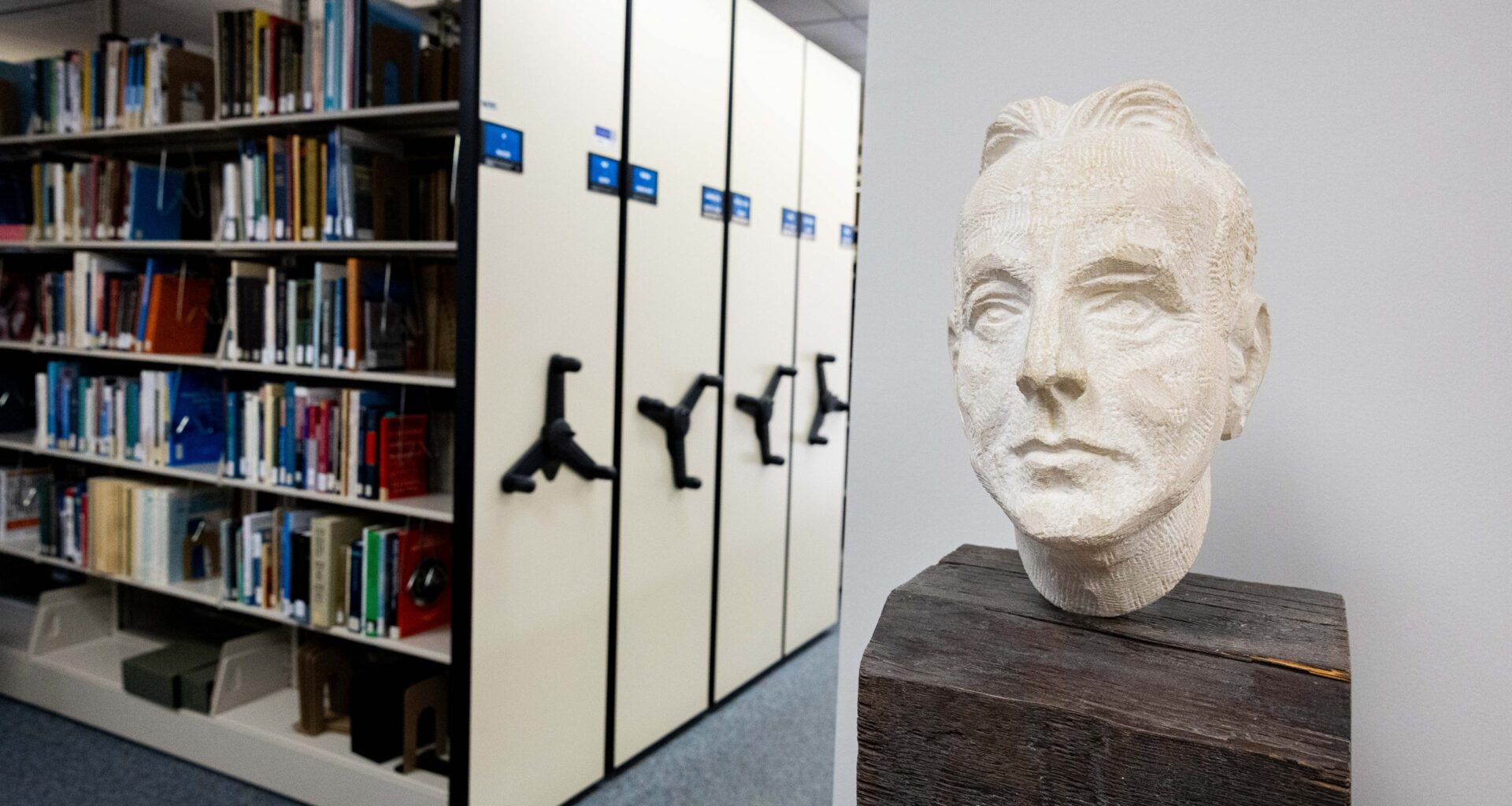Tucked inside a small climate-controlled vault in Southwest Research Institute’s library are hundreds of books you’d be hard pressed to find elsewhere, including a banned book by Galileo illegally reproduced in 1710.
The rare and unique book collection boasts 250 books chronicling the history of science, engineering and mathematics at SwRI’s Thomas Baker Slick Memorial Library.
SwRI is a nonprofit research and development institute founded in 1947 by the wealthy oilman, philanthropist and adventurer Tom Slick, who also founded SwRI’s biomedical counterpart and sister nonprofit, Texas Biomedical Research Institute.
The SwRI library sits in the middle of their 1,500-acre campus on the West Side of San Antonio near Culebra Road.
Some of the more notable books sit in a small display room with tinted windows to protect the pages and ink from fading.
An unassuming climate-controlled vault behind the display room contains the rest of the collection, each book protected by an archival-quality cardboard case. The vault stays within a specific humidity and temperature range, and it relies on a specialized, waterless, fire protection system to extinguish a fire without damaging the books.
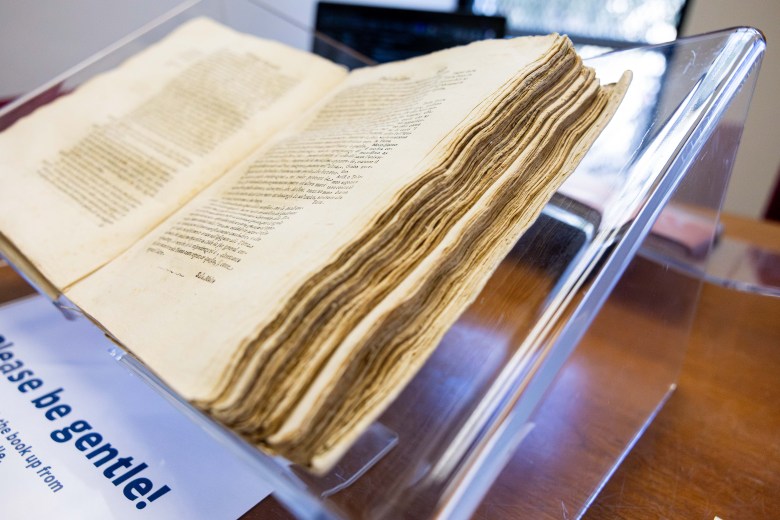 When not on display or actively in exhibit, books are kept in cardboard covers inside a temperature and humidity controlled vault to prevent further deterioration. Credit: Amber Esparza / San Antonio Report
When not on display or actively in exhibit, books are kept in cardboard covers inside a temperature and humidity controlled vault to prevent further deterioration. Credit: Amber Esparza / San Antonio Report
The library collection was curated by former SwRI leaders Hyman Norman Abramson and Martin Goland in the 1960s and ’70s. The two men would visit conferences, conventions and rare book stores to buy unique texts foundational to scientific progress. Most of the books are focused on physics, mathematics and astronomy.
The men collected the books on their own dime, donating what they purchased to the library. When Abramson died in 2022 at the age of 96, he bequeathed SwRI $250,000 to continue adding to the library’s collection.
The latest book added to the library’s collection was by Scottish scientist Mary Somerville, obtained in 2021.
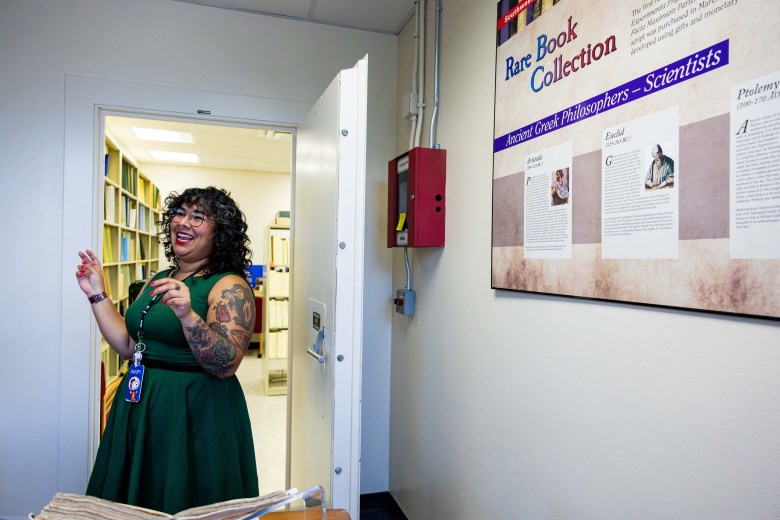 Valerie Darling, a librarian at the Thomas B. Slick Memorial Library, has been at the Southwest Research Institute since April 2020, where she first began as an intern. Credit: Amber Esparza / San Antonio Report
Valerie Darling, a librarian at the Thomas B. Slick Memorial Library, has been at the Southwest Research Institute since April 2020, where she first began as an intern. Credit: Amber Esparza / San Antonio Report
One of the library’s goals is to add more books authored by women to their collection, according to Valerie Darling, the librarian who oversees the collection.
Darling’s personal favorite rarity is a 2010 version of “Around the World in 80 Days” by French writer Jules Verne originally published in 1872. The 2010 version was one of the first books to contain QR codes on each page, which served as links to online footnotes and discussion about the book’s contents. Needless to say, the QR codes no longer work.
“It is a piece of history,” she said, “and it’s not even that old, and it’s already broken.”
The definition of a “rare or special” book can be a bit amorphous, Darling explained. Some books are simply considered special and rare because they’re signed or annotated by notable figures, like Tom Slick, whose signature appears in many of the books. Most of the books are simply early, rare versions of books printed in the 16th century.
The Galileo book is considered their crown jewel. The Italian scientist’s “Dialogue Concerning the Two Chief World Systems” was originally published in 1632. It lays out arguments for and against heliocentrism, the theory that the Earth and other planets orbit the sun, then thought to be the center of the universe.
Galileo’s advocacy for this theory angered Catholic Church authorities, who believed that everything orbited around the Earth, labeling his work as contrary to holy doctrine and landing his book on the Index of Forbidden Books.
Many scientists would come around to Galileo’s theory in the coming decades, but the church needed another century to think about it. The version in SwRI’s possession is a second edition of the book, illegally reproduced in Italy in 1710, six decades after Galileo’s death still sitting comfortably on the church’s list of banned books.
It’s by far the highest value book in the collection, with an estimated appraised value of $6,000. It was purchased by the library in 1974, for $250.
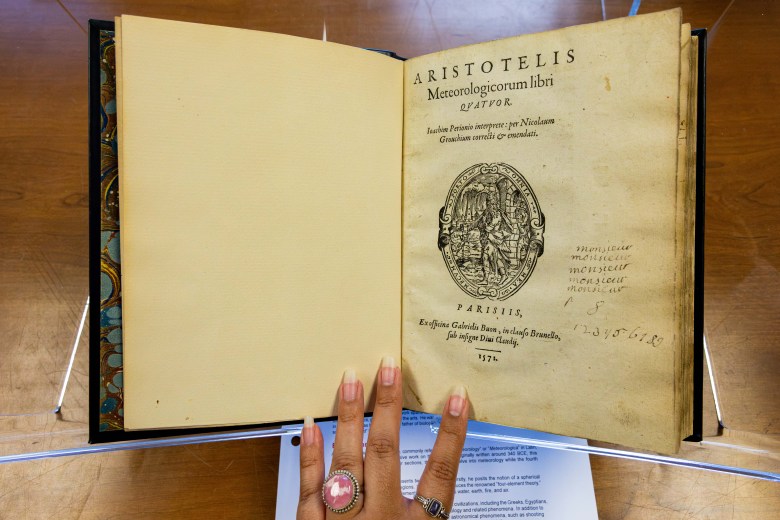 Aristotle’s “Meteorologicorum libri quatour” was originally published in 1571. This copy is appraised at $2,000. Credit: Amber Esparza / San Antonio Report
Aristotle’s “Meteorologicorum libri quatour” was originally published in 1571. This copy is appraised at $2,000. Credit: Amber Esparza / San Antonio Report
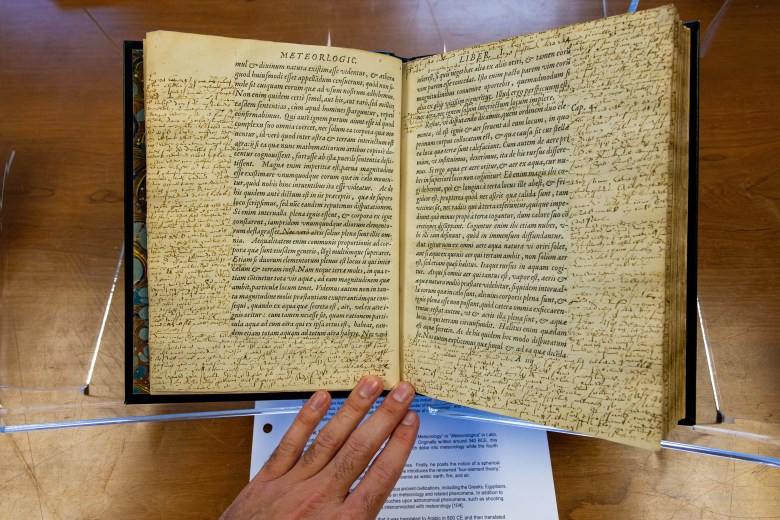 Original annotations can be seen in this copy of Aristotle’s “Meteorologicorum libri quatour.” Credit: Amber Esparza / San Antonio Report
Original annotations can be seen in this copy of Aristotle’s “Meteorologicorum libri quatour.” Credit: Amber Esparza / San Antonio Report
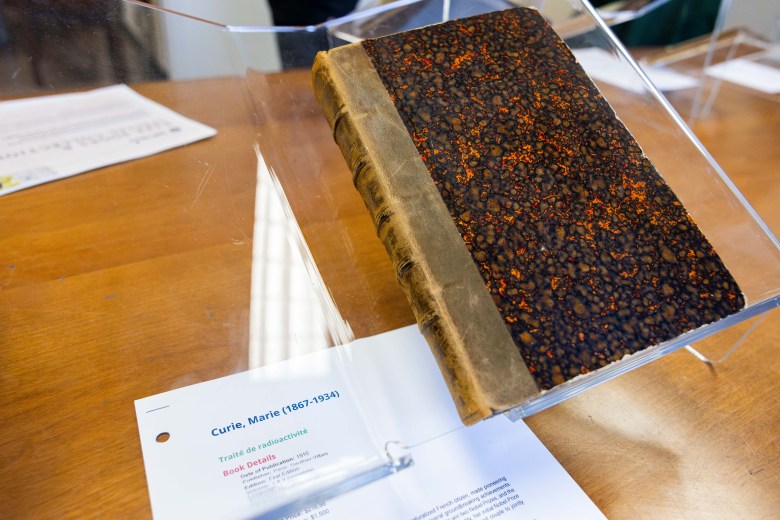 A first edition of Marie Curie’s “Traité de radioactivité” from 1910. Credit: Amber Esparza / San Antonio Report
A first edition of Marie Curie’s “Traité de radioactivité” from 1910. Credit: Amber Esparza / San Antonio Report
Other notable books include Polish scientist Marie Curie’s seminal work on radioactivity; a book by Aristotle on meteorology, annotated heavily by an unknown reader; and a book by Ptolemy, a Greek-Roman scientist and mathematician who used geometry to describe the motion of stars and planets. The Ptolemy book is the oldest in the collection, printed in 1556, and still in good condition, Darling said.
The rare books collection is open to the public, but requires an appointment for viewing. Darling, who has been with the library since 2020, said she’s still learning about the books, their importance and the authors, often relying on the scientists at SwRI for help.
“I am not a STEM background person, like at all,” she said. “I’m probably only like 10% of the way done getting all of this.”

